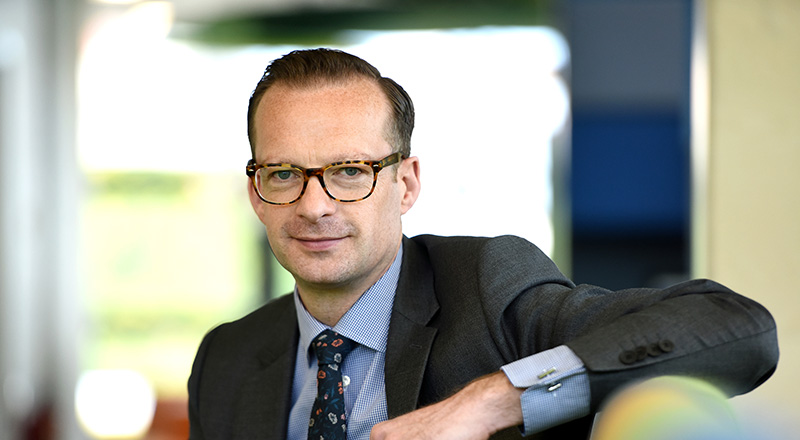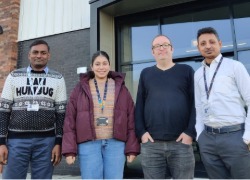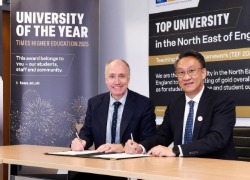Understanding the impact of AI in education
By
Professor Mark Simpson
Deputy Vice-Chancellor
This month Teesside University hosts its inaugural National Future Facing Learning Conference bringing together industry leaders, researchers, and educators to share best practice and explore the future of Higher Education. Deputy Vice-Chancellor Professor Mark Simpson looks at how Artificial Intelligence (AI) is impacting the sector, and wider society, and argues that figuratively, if not quite literally, it is alive and well and here to stay.

From Microsoft Office to the Amazon platform, AI underpins most of the software and technology that we use in everyday life.
We are continuously seeing advancements in AI – tech companies have invested heavily in exploring its capabilities; businesses are increasingly adopting AI-based systems and processes; and people eagerly await the next ‘big thing’.
As educators, we encourage our students and staff to experiment and innovate, our very purpose is to prepare graduates for the future world of work, so shouldn’t we be leading by example?
To date, much of the university sector discourse around AI has been focussed on the threats it poses, particularly relating to assessment; how can we monitor this? How can our current systems cope with it? And so, regrettably, most universities’ initial response was to incorporate AI into academic misconduct regulations, whereby, using it would be met with severe penalties.
Yet, this does not reflect the lived reality of people outside of the academic bubble, nor the natural curiosity of our students and staff and their freedom to explore – traits we claim to encourage. With AI so firmly integrated across many of our lives and developing at an extraordinary pace, wouldn’t we be failing in our duty as educators if we were to reject it out of hand?
At Teesside University, we believe that if we are to deliver education which is truly future facing, we need to be at the forefront of the discovery stage of new technologies, leveraging AI to enhance learning, teaching and, ultimately, the workplace.
The AI debate presents an opportunity to rebalance the focus of the learning journey. At Teesside, we have reviewed our learning processes, moving away from a single end-point assessment and towards a model that celebrates the learning journey, with assessment taking place in real-time as a dialogue.
We are making our assessments more relevant to skillsets which students will need in the workplace, like communication, teamwork, resilience and innovation.
The clinic system championed at Teesside University is a fantastic example of how we embed these skills within the curriculum. Whilst generative AI may be able to draft a complex legal contract, it is never going to be able to support or console a worried client. The Teesside Law Clinic, however, teaches students how to do just that, by offering them the opportunity to work with real people on live cases.
The benefits of this project-based assessment approach are twofold. Not only does it provide students with vital real-world skills, but it is also very difficult for an AI to replicate. For example, how will a computer program be able to understand the individual needs of a local business as effectively as a student who has worked directly with the individuals involved.
At Teesside University, we believe that if we are to deliver education which is truly future facing, we need to be at the forefront of the discovery stage of new technologies, leveraging AI to enhance learning, teaching and, ultimately, the workplace.
Alongside a robust assessment system, we need to understand how AI is going to impact the workplace once our students graduate and develop our curricula accordingly.
While AI is unlikely to result in the wholesale loss of jobs, there is little doubt that it will impact tasks that people might ordinarily do in the workplace. If we continue to teach those tasks in the same way we always have, we are not necessarily equipping our students with the skills that they will need in the future.
A prime example of this is coding. For many years coding has been a central tenet of education policy, with children being taught it from primary school age. Now AI technology means a lot of coding tasks can be done by simply typing in a command. While coding is still a vital skill, we need to understand how it will be applied with the advent of AI.
The complexity of AI means a one-size-fits-all approach is not the solution, and AI’s impact must be understood at a local level. This is true of all sectors and industries, not just education. At Teesside we are in the process of developing an AI policy. However, we fully expect this to be nuanced and implemented in different ways depending on the subject or sector. We must understand the tasks that AI can carry out in our business that people can’t, and where it can, or cannot, add value to what we do.
I have always been extremely positive about embracing technology where it can enhance learning and teaching, however we must also recognise its limitations and in some cases, threats, and ethical implications. We need to be aware of these less positive aspects and develop ethical frameworks in which to operate.
While it may be appropriate to use AI in developing a computer program or performing complex calculations, is it ethical to use in a subject such as photography? And, if so, how do we educate people to tell the difference between an AI generated image and one taken in life. If indeed it is possible. These are the questions we need to be asking and developing solutions and answers.
Whatever the organisation, an AI strategy needs to start with people and supporting them to understand the technology and its capabilities. It can seem complex and inaccessible but managed correctly it represents a real opportunity to significantly enhance the future of education and business.
 Groundbreaking project to unlock nuclear energy's role in
...
Groundbreaking project to unlock nuclear energy's role in
... Start the new year by expanding your knowledge
Start the new year by expanding your knowledge  Teesside University strengthens long-standing partnership
...
Teesside University strengthens long-standing partnership
...